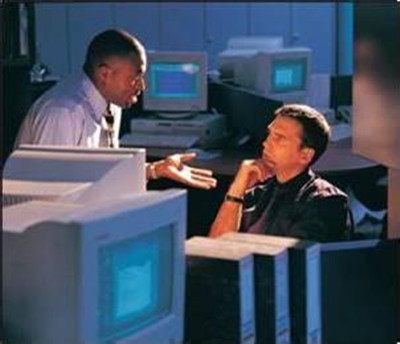校園里的計算機技術
Hello world!
你好世界!
Training an army of tiny techies
訓練一支微型計算機專家隊伍
“I CALL this a playground,” says Vinay Patel, gesturing to a score of monitors in the computer lab of Avanti House School in North London: “I tell pupils not to be scared of mistakes.” The two dozen teenagers in his classroom are among the first to follow a radically reformed technology curriculum which comes into force this month. But they are not the only ones learning new tricks. Though his background is in product design, Mr Patel has spent the summer grappling with Python and Java, two computer languages he will teach as part of the course.
北倫敦阿凡提豪斯中學的電腦實驗室里,維奈·帕特爾指著二十個顯示器說:“我把這叫做游樂場。我告訴學生們不要害怕犯錯。”一項徹底的科技課程改革將于本月開始實施,他班里的二十四個青少年學生是首批吃螃蟹的人之一。但他們不是唯一學習新技術的人。盡管帕特爾的專業背景是產品設計,他整個夏天都在努力學習Python和Java,這兩種電腦語言的教學將成為課程的一部分。

Information and communications technology has been on school timetables since 1990. But lately it has grown unfashionable. In 2012 the Royal Society reported that dreary instruction in word-processing and spreadsheet software had made lessons “demotivating and routine”. That reputation has made it difficult to attract good teachers and has dulled enthusiasm for the subject.
信息與通訊技術自1990年便登上了學校的課表。但最近它的風頭漸弱。2012年,英國皇家學會報告,文字處理和試算表軟件的沉悶教學使得課程變得“毫無動力、平淡乏味”。這樣糟糕的聲譽難以吸引優秀的老師,也澆熄了學生對這門學科的熱情。
This year’s change replaces ICT with a new subject called “computing”, which is mandatory for children in England aged five to 16. Tiddlers will learn about algorithms and other basic concepts of computer science; older kids will learn to use at least two programming languages. Big chunks of the course can be taught without computers; boosters say it will give children lasting problem-solving skills.
今年的改革是以一門名為“計算機技術”的新學科取代ICT,英國5至16歲的學生都將被強制要求學習這門新學科。小孩子們要學算法和計算機科學的其他基本概念;大一點的孩子要學習使用至少兩種編程語言。大量的課程可以在沒有電腦的情況下進行教學。支持者認為這將使孩子們在問題解決方面終身受益。
In part the overhaul aims to produce eager recruits for Britain’s growing technology firms. They cannot keep relying on a small pool of self-taught enthusiasts, reckons Bill Mitchell of BCS, an industry body. “Some people are so intelligent you could lock them in a room and hit them with a stick instead of sending them to school and they’ll still be successful,” he says. “But this will help children of all abilities.”
在某種程度上,這次大改革的目的是為英國欣欣向榮的科技公司提供熱切的新雇員。行業組織英國計算機協會的比爾·米歇爾認為這些公司不能一直依賴少部分自學成才的愛好者,他說:“有些人就是天才,就算你不送他們去上學,反而把他們鎖在一個屋子里,用棍子打他們,他們還是會成功。但這次改革將會對所有的孩子都起到幫助作用。”
By requiring five-year-olds to study computer science, England has leapfrogged countries such as America. The EU thinks England is a model for its neighbours; Asian governments are watching closely, reckons Rachel Swidenbank of Codecademy, an education firm.
通過要求5歲的兒童學習計算機科學,英國已超越一些國家,比如說美國。歐盟認為英國是鄰國的典范。蕾切爾·斯維頓班克來自一家名為Codecademy教育公司,她推測亞洲政府部門也在密切關注這一改革。
Yet some debugging is needed. The government has found only about £3m to train 200,000 or so teachers. Enthusiasm varies among free schools and academies. The reform will need years of support, thinks Simon Peyton Jones of Computing at School, a charity. “It’s like a rocket at take-off. It could still explode.”
然而還有一些調試時必然的。政府僅提供了三百萬英鎊的基金來培訓200,000人左右的教師。在免費學校和院校里,人們的熱情不一。來自慈善機構“學校里的計算機技術”的西蒙·佩頓·瓊斯認為這場改革需要多年的支持,他說:“這就像起飛時的火箭,仍有可能發生爆炸。”












